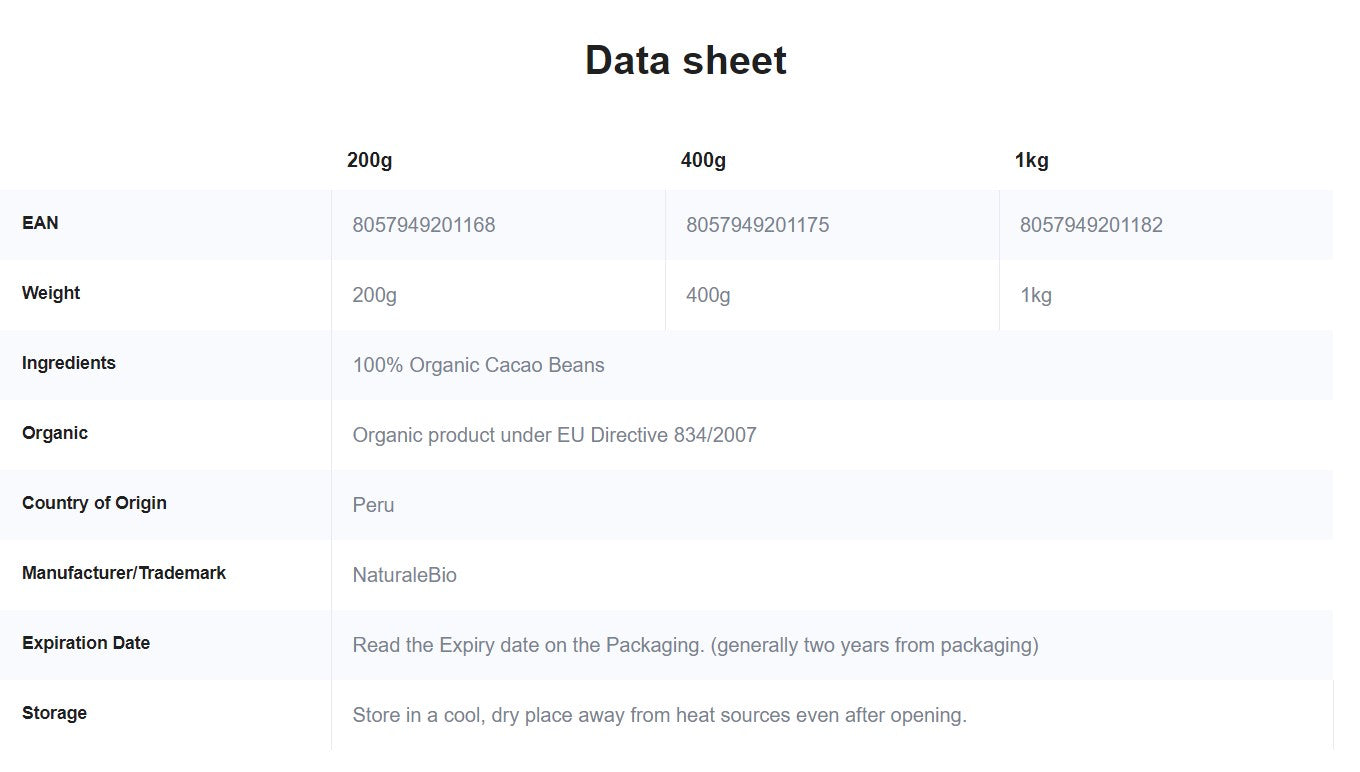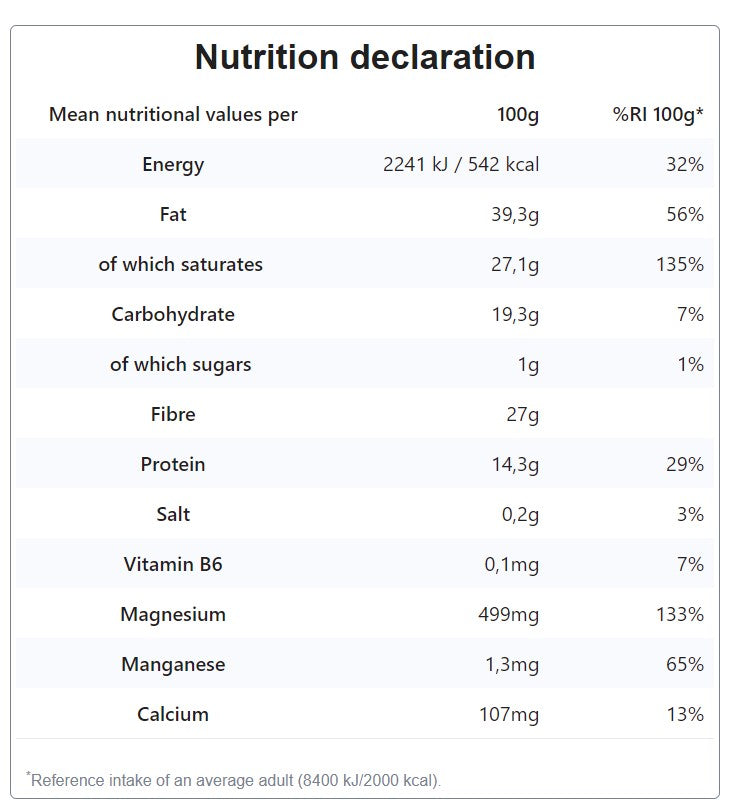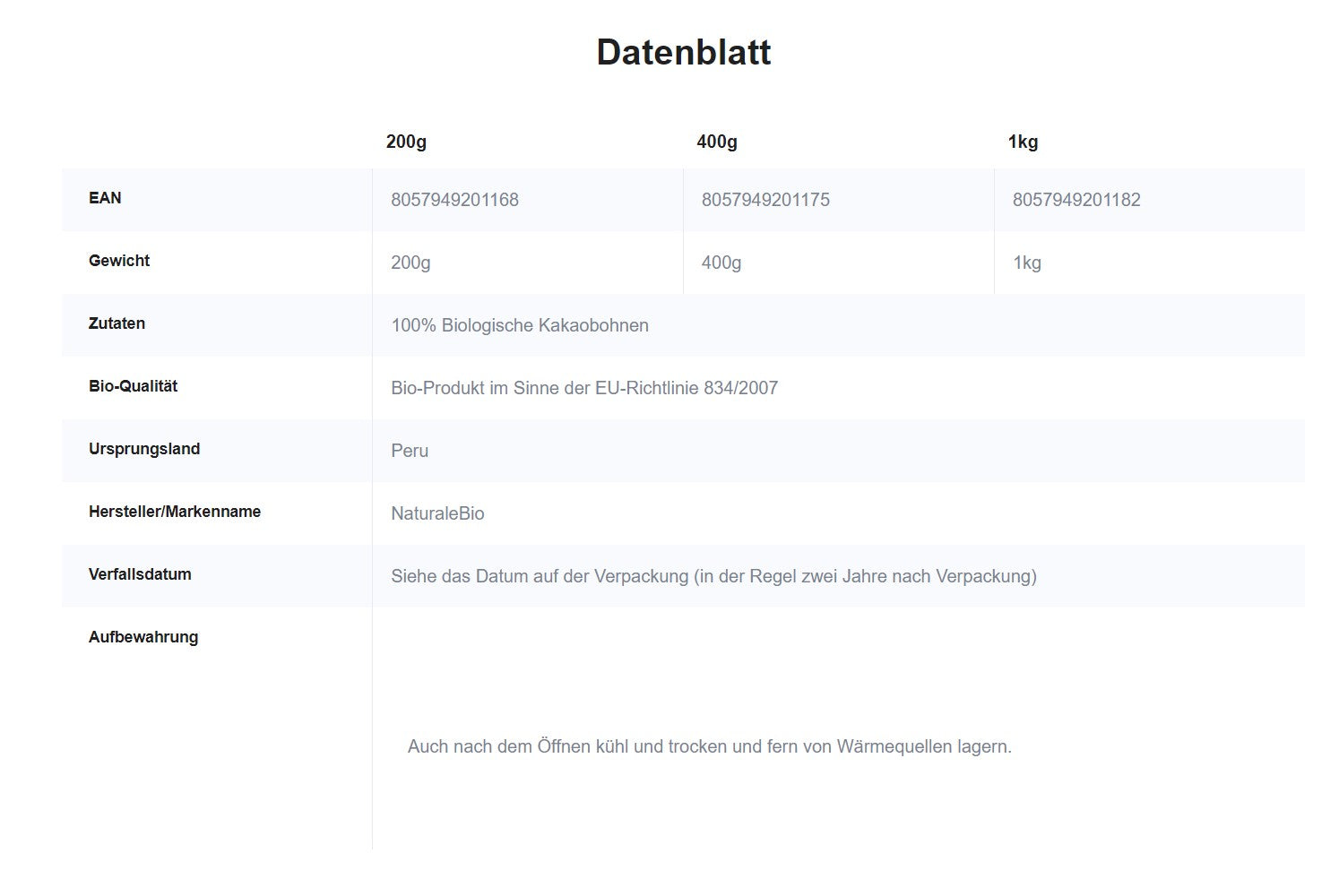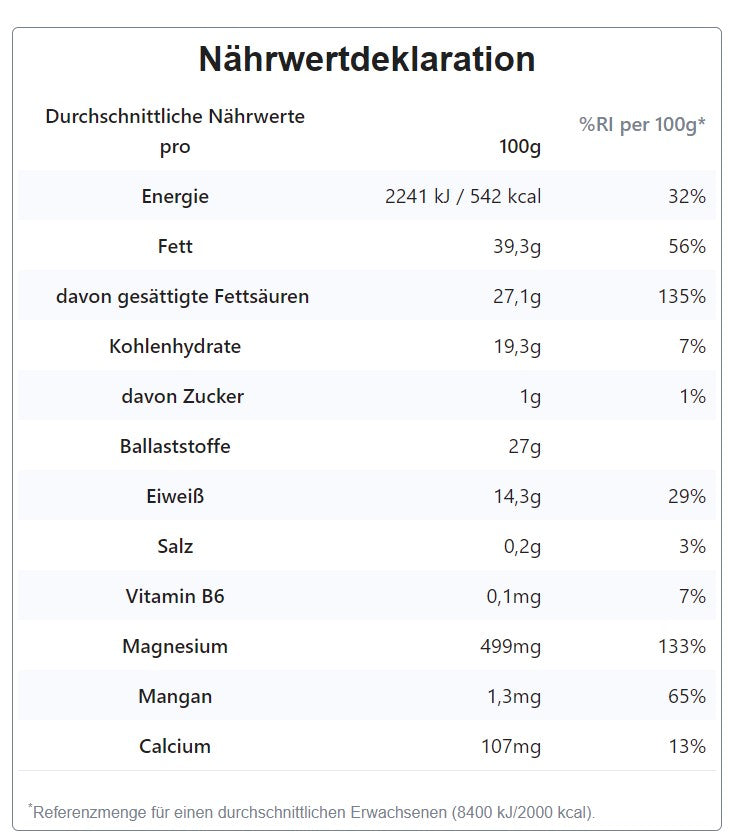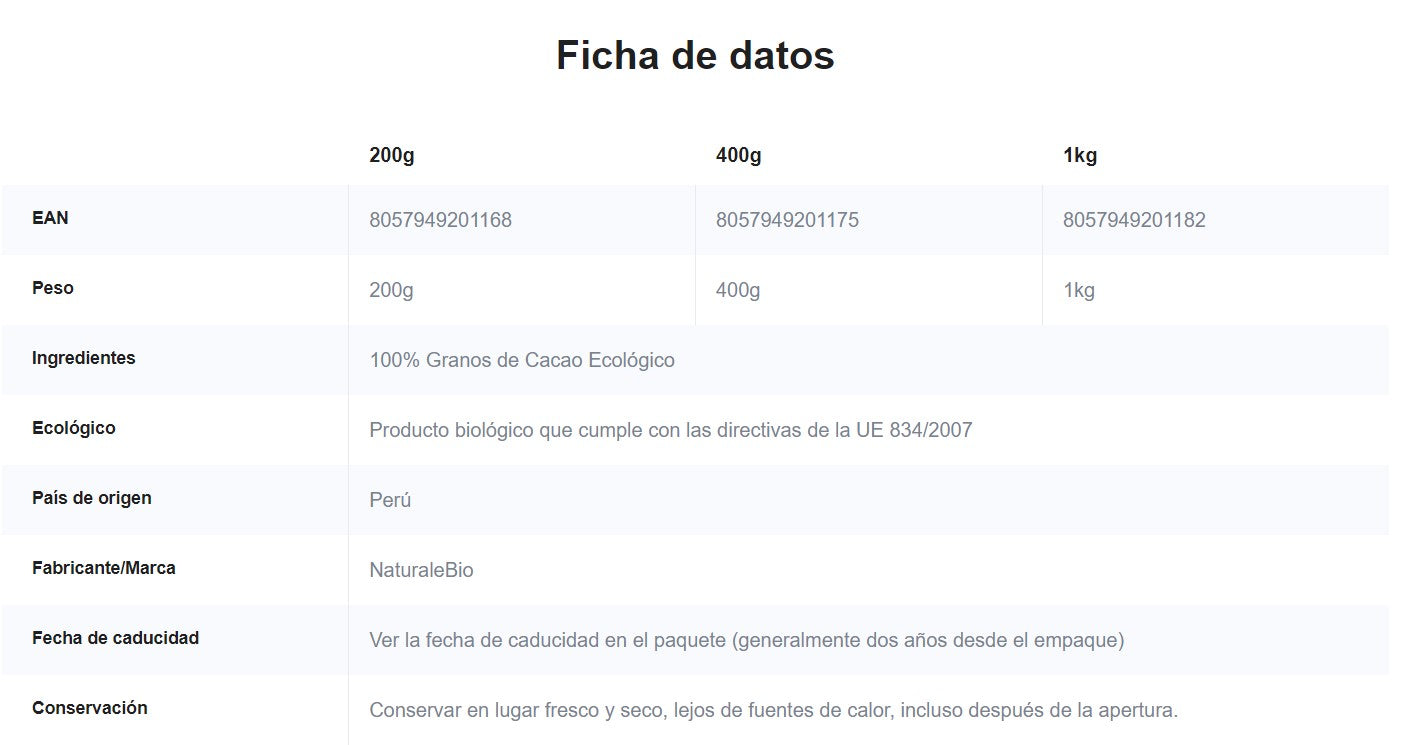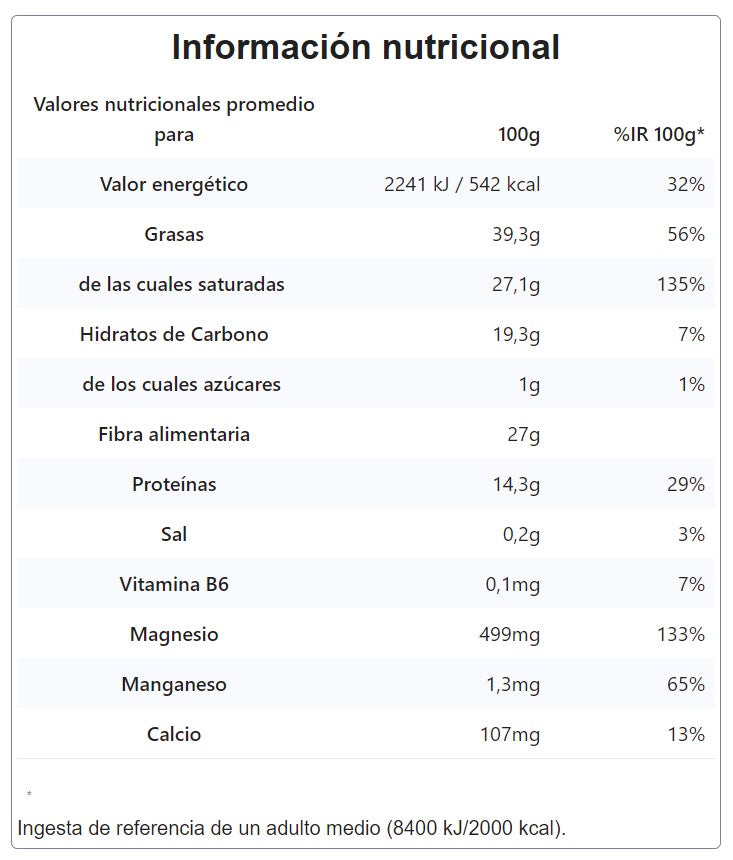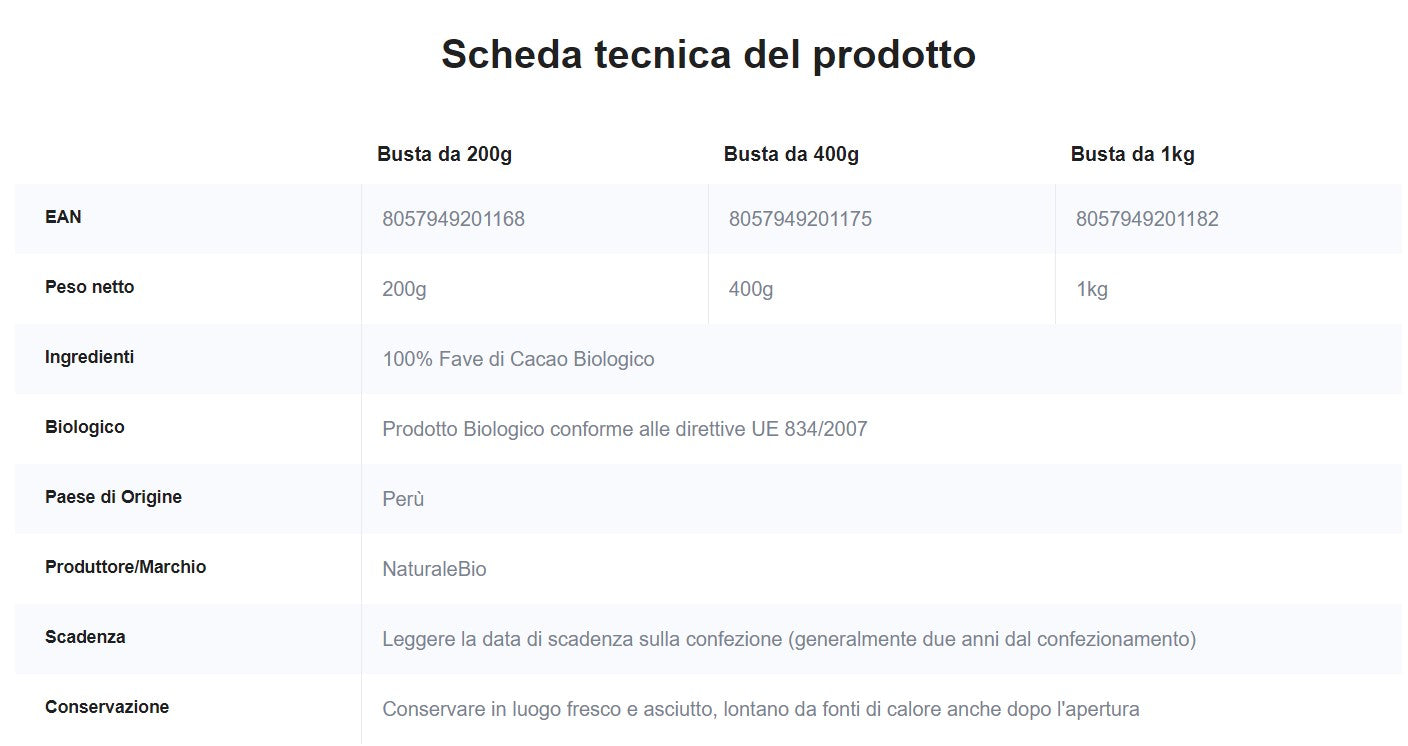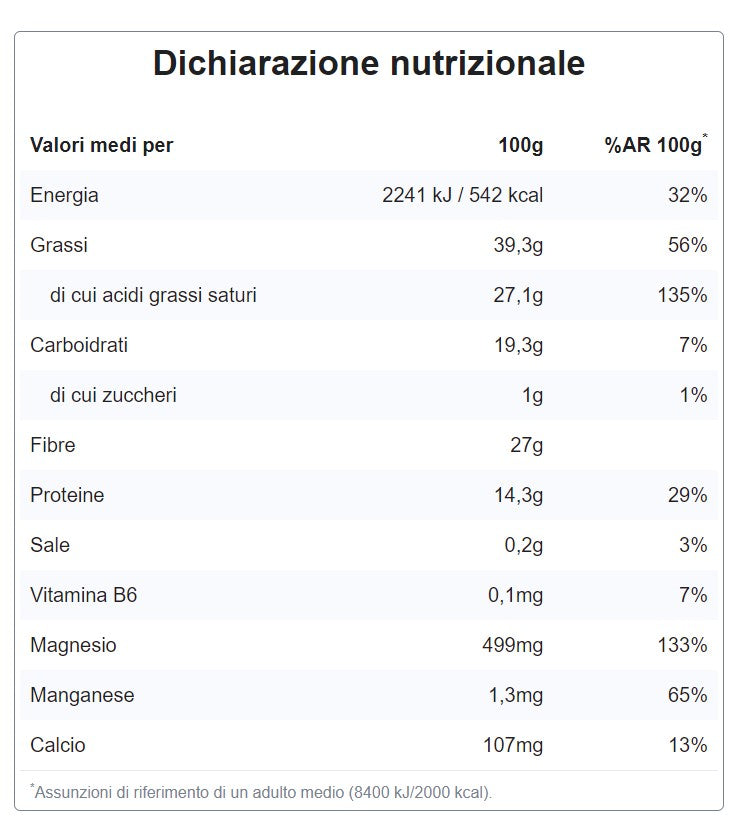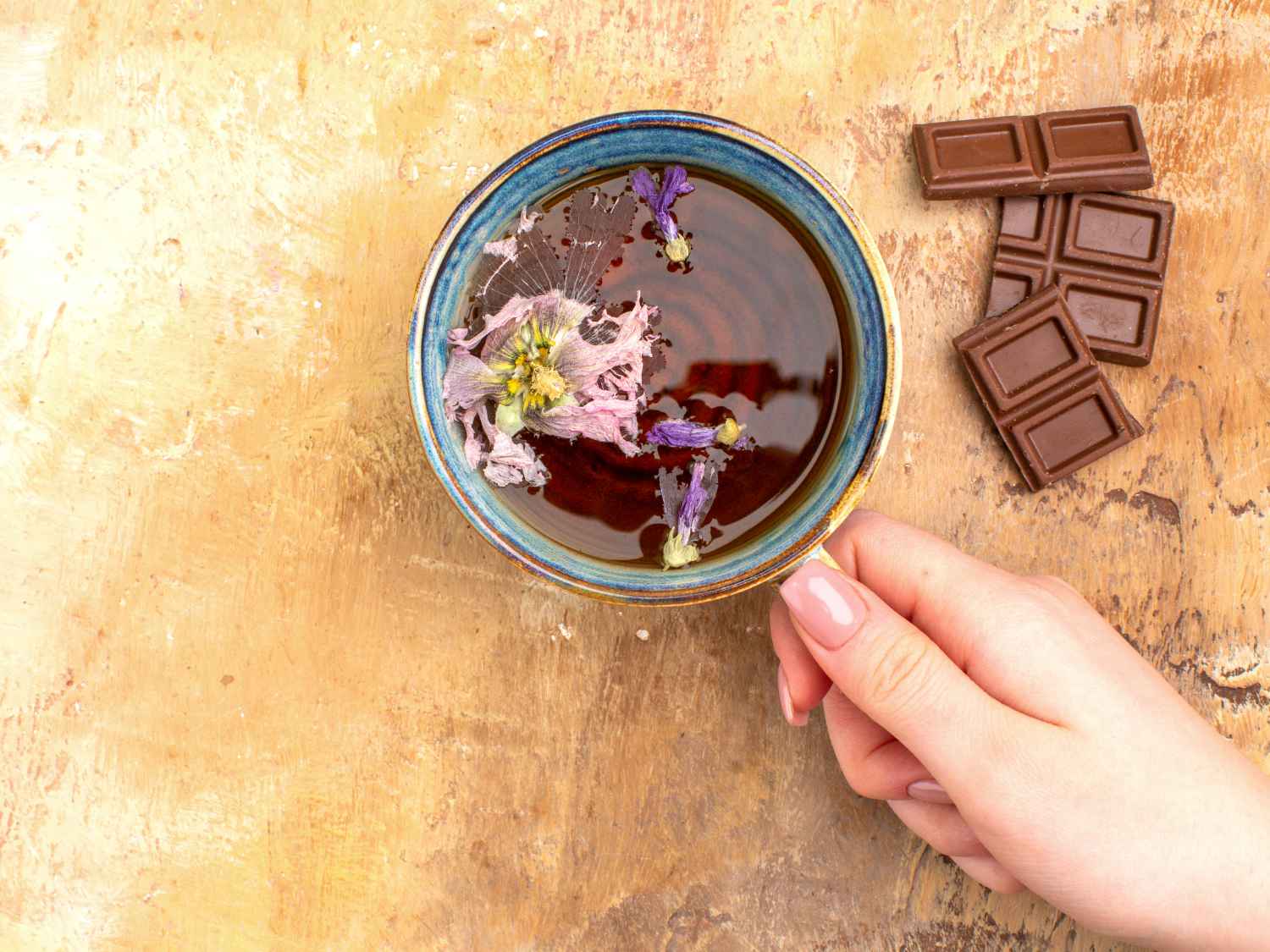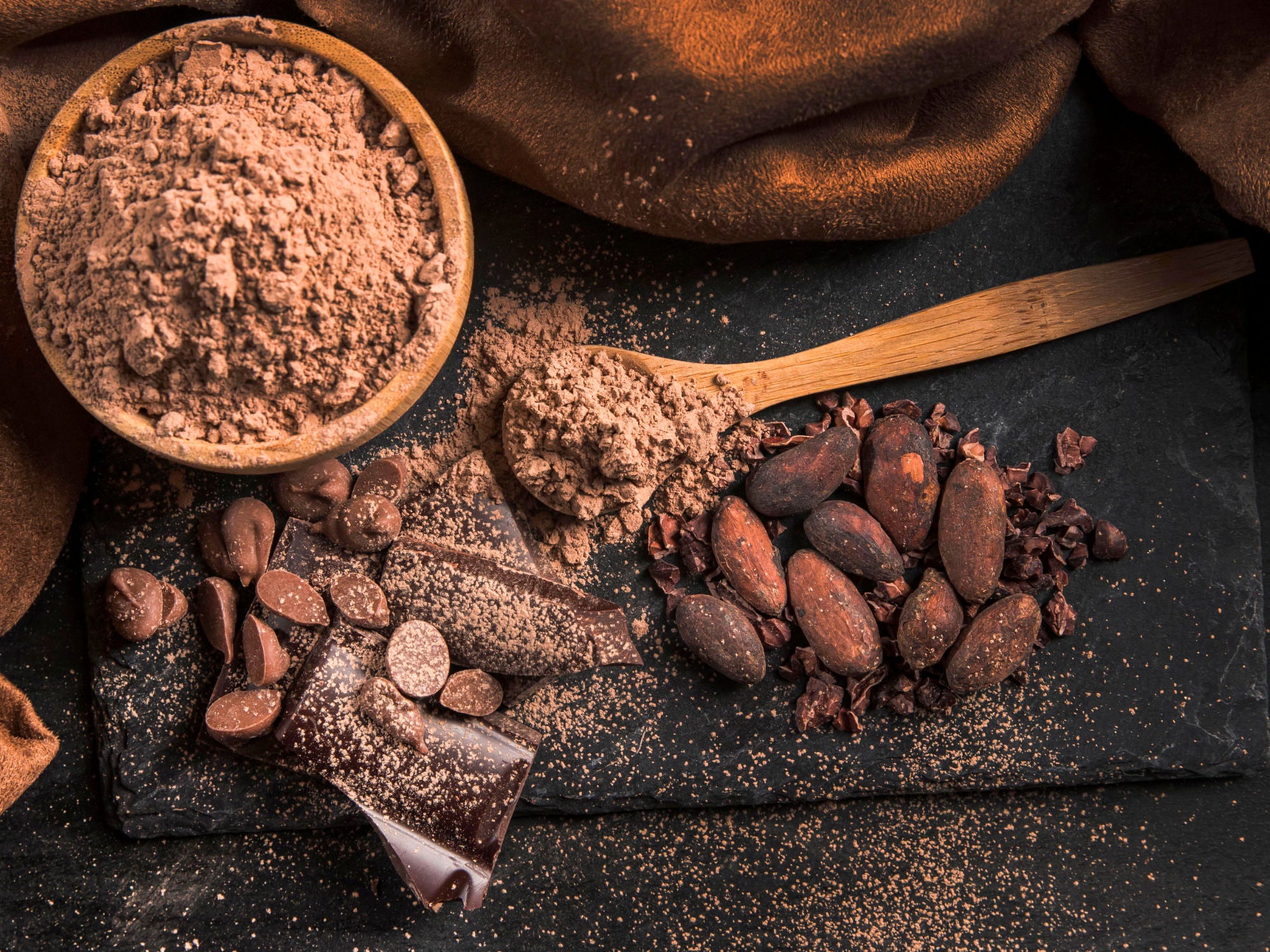
- Regular price
- €12,99 EUR
- Unit price
- per
Organic Raw Cacao Beans. 100% Peruvian, Natural and Pure. Made in Peru from The Theobroma Cacao Plant
Couldn't load pickup availability.
Characteristics
-
Made in Peru
Cocoa is what Linnaeus called Theobroma, from Theos meaning “god” and broma “food”, that is, food of the gods. Cocoa is a tropical tree whose natural habitat is in the lower layer of the rainforest. It is therefore found in Its favourable habitat is in tropical forests, where it finds a constant climate all year round, with abundant rainfall well distributed throughout the year.
-
Raw Cocoa Beans
Cocoa requires a complex and long processing. The beans are harvested manually and the drying method takes place at low temperatures to preserve all the nutrients inside it intact.
-
Certified Organic and 100% Vegan
100% Pure and Organic. Without the use of pesticides and unnatural chemical fertilizers that are not helpful for the body and health. Produced in Peru and certified Organic by control bodies authorized by the Ministry of Agriculture.
Cocoa Beans
Biological
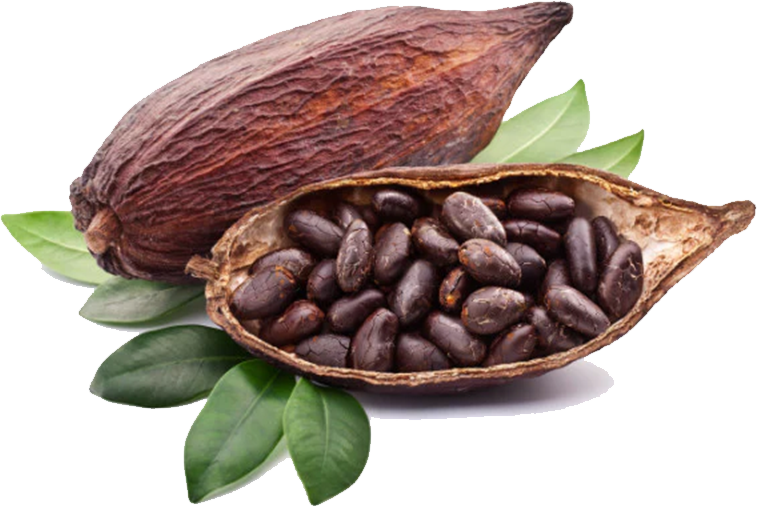
Raw cocoa beans
Cocoa requires a complex and long processing. The beans are harvested manually and the drying method takes place at low temperatures to preserve all the nutrients inside it intact.
FAQ
Useful Information
What is Cocoa?
What is Cocoa?
Cocoa is what Linnaeus called Theobroma , from Theos which means “god” and broma “food”, or food of the gods . Capable of bringing well-being and satisfaction, and science today confirms that cocoa not only makes you happier , as it is able to promote the production of endorphins, but also healthier . The richness of this plant is certainly mainly contained in the beans contained in its fruit (cabosse). The beans can be eaten raw, or they can be reduced to granules or powder depending on the type of consumption.
The Cocoa Plant
The Cocoa Plant
The wild cocoa plant is very diverse . Throughout its history it has given rise to a huge variety of within its species, due to numerous mutations. The plant develops in height and reaches 2 meters, then the branches extend to form a roof, until reaching 3 meters. The cocoa plant produces fruit continuously , but in general each plant gives two harvests, one before and one after the rainy season. From the flower to the ripening of the pod , which is the fruit, it takes about 6 months. The life of a plant is about 25 years and it is not a plant suitable for intensive cultivation.
Where Cocoa is Grown
Where Cocoa is Grown
Cacao is a tropical tree whose natural habitat is in the lower layer of the rainforest . All species of cocoa need regions where the temperature and humidity are high, rainfall is heavy and shade is dense. The plant grows only below 1000 m altitude, on slightly acidic and humid, but well-drained soils. It therefore finds its favorable habitat in tropical forests , where it finds a constant climate all year round, with abundant rainfall well distributed throughout the year.
History of Cocoa
History of Cocoa
The first evidence of a rudimentary production of chocolate dates back to 1800 BC in the areas of Central America in today's Mexico. The history of the Maya is also closely linked to cocoa, they were probably the first to cultivate the plants. Cocoa was also very important from an economic point of view, with the development of the Toltec and Aztec civilizations, cocoa beans were also used as currency. The first to know about it was Christopher Columbus in 1502, when the Aztec leader offered hospitality and cocoa beans, the country's currency, to the whites who came from far away. It later arrived in Europe and is still appreciated throughout the world. Today cocoa beans are a commodity , therefore a primary product that constitutes a fundamental object of international exchange, with a unique global value.
Taste and texture
Taste and texture
Our cocoa comes from organic farming . You can find cocoa in the form of beans, nibs or powder. The beans keep all the nutritional properties of cocoa intact thanks to drying at low temperatures. The cocoa beans are cleaned and divided according to size. The aromatic profiles of cocoa can be countless and must be intense and persistent. By touch (by touch we mean the tactile sensations perceived by our tongue in contact with cocoa) we must recognize the fineness and roundness of cocoa, while astringency or the sensation of decreased salivation must be almost absent.
How to take Cocoa?
How to take Cocoa?
Organic cocoa beans are considered a good way to integrate this precious food into your diet. Cocoa beans can be eaten as a convenient snack or in smoothies or desserts. They can also be used to obtain cocoa nibs or powder depending on the grinding.
Recipes with Cocoa
Recipes with Cocoa
Cocoa beans can be consumed in the following ways:
- chocolate shake
- as an ingredient for homemade cakes and desserts
- in the pastry shop
- in smoothies
- in the preparation of biscuits
- to obtain cocoa nibs
- to obtain cocoa powder
We at NaturaleBio sell and market Organic Cocoa Powder, Beans and Nibs.
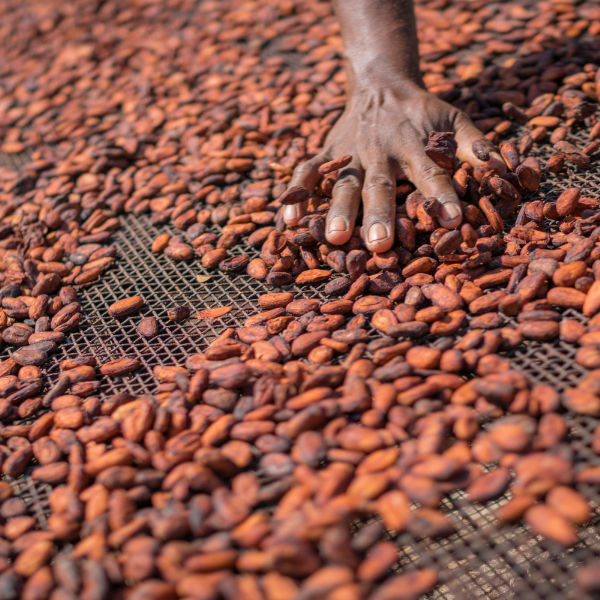
How raw cocoa is processed
Harvesting. Harvesting and processing is almost entirely done manually.
Fermentation. The beans are completely covered with a white, gelatinous substance, which triggers the fermentation process and can last from 5 to 7 days.
Lifting. During fermentation the beans are moved every day with special shovels, this is still done manually.
Drying. Cocoa beans are dried in the sun, at low temperatures to immediately stop the fermentation process.
Cleaning and Selection. The beans are cleaned using a machine composed of cylinders and divided according to their size.
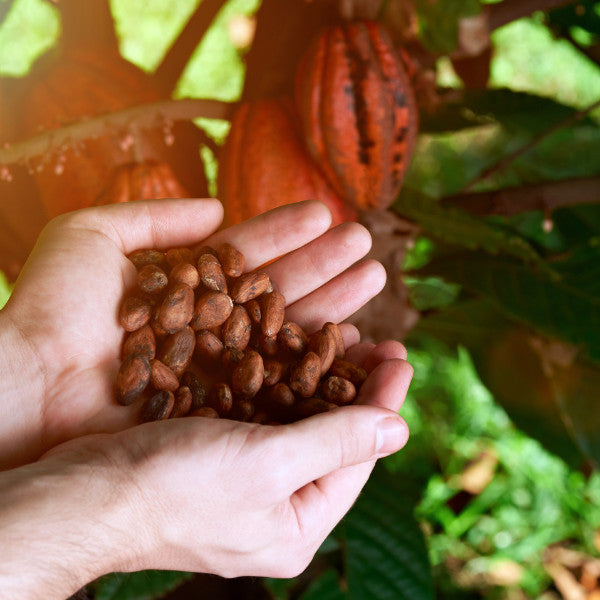
100% Organic
Our cocoa beans are 100% pure and organic, produced in Peru on organic plantations and approved by the Control Body of the Ministry of Agricultural Policies. Our cocoa comes from Peru, a South American country among the first in the world. for the quality of the cocoa and for its thousand-year-old tradition.
At NaturaleBio we pay particular attention in selecting all our organic products.
The best cocoa comes from organic farming. Considered a Superfood , used and appreciated throughout the world for its countless beneficial properties.
Recipes with Cocoa Beans
-

The Granola
Preparation time: ~30 min
Irresistible crunchy morsels that you can add to milk, almond or soy, or mix with yogurt!
Ingredients
- 150g of oat flakes
- 2 tablespoons maple syrup
- 2 tablespoons of barley malt
- 1 tablespoon of NaturalBio coconut oil
- 50g of pumpkin seeds, sunflower seeds, ginger seeds and NaturalBio Cocoa Nibs
- 1 pinch of salt
- 1 pinch of cinnamon
Preparation
In a bowl, pour the flakes, seeds, cocoa nibs, cinnamon and salt. Mix the liquids separately (maple syrup, barley malt and coconut oil). Add the liquids to the dry ingredients and mix everything together. Spread the granola on a baking sheet covered with baking paper and bake for about 15-20 minutes at 180° until golden. Now you can add these irresistible crunchy morsels to milk, almond or soy or mix them with yogurt!
-

Caramelized Pineapple
Preparation time: ~10 min
A recipe that smells of summer and is incredibly simple…
Ingredients
- 1 Pineapple
- 1 organic lemon
- Mixed Berries
- Mint leaves
- 2 cups of passito wine
- 2 cups of water
- 4 tablespoons agave syrup
- 4 tablespoons of NaturaleBio cocoa nibs
Preparation
Cut the pineapple into triangles and let them marinate with the lemon juice and mint leaves (about 10). Drain the pineapple and grill it on a hot griddle. Sprinkle the mixed berries with lemon juice. In a pan, combine the passito wine, water and agave syrup, which must dissolve over low heat. Add the pineapple slices and reduce the sauce until it is almost completely dry. Plate the pineapple, adding mint leaves, berries and sprinkling cocoa nibs on top or with coarsely chopped cocoa beans.
-

Banana Smoothie
Preparation time: ~15 min
Flax seeds are rich in fatty acids and vitamins and minerals that strengthen the immune system, dates are rich in iron, fiber and minerals and finally cocoa beans, a powerful antioxidant!
Ingredients
- 1 Banana
- 2 dates
- 100 ml of Rice Milk
- 1 teaspoon of Flaxseed
- 1 teaspoon hazelnut cream (optional)
- 3 NaturalBio Cocoa Beans or NaturalBio Cocoa Nibs
Preparation
Cut the dates into pieces and soak them in rice milk for about 10 minutes. Put all the ingredients except the cocoa beans in a blender and blend until you get a thick and creamy mixture. Serve completing with the roughly chopped cocoa beans or with the cocoa nibs. NB If you prefer it more liquid you can add more milk.
